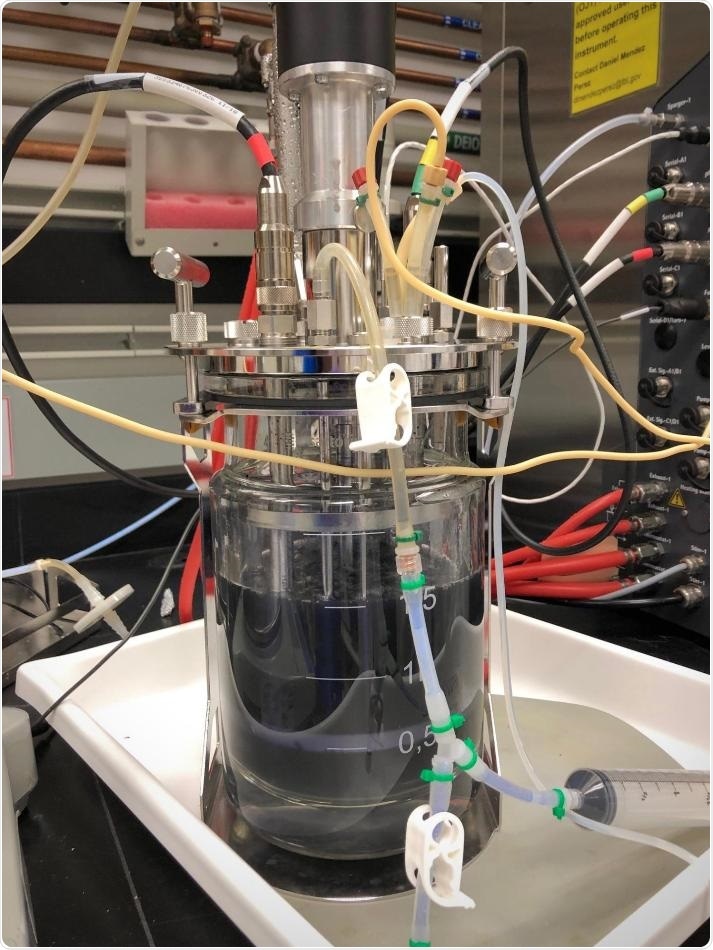At the Lawrence Berkeley National Laboratory (Berkeley Lab), scientists have accomplished a major breakthrough by altering a microorganism to efficiently create a target compound using CRISPR-based gene editing and a computational model.

A two-liter bioreactor containing an E. coli culture that has undergone metabolic rewiring to produce indigoidine all the time. Image Credit: Berkeley Lab.
The researchers’ method could significantly accelerate the research and development phase for novel biomanufacturing processes, and get advanced bio-based products, like plastic alternatives and sustainable fuels on the shelves faster.
The process employs computer algorithms, which is based on real-world experimental data, to detect which kinds of genes found in a “host” microbe could be turned off to redirect the energy of the organism toward producing large amounts of a compound of interest, rather than its usual soup of metabolic products.
Presently, several investigators in this area still depend on ad hoc, trial-and-error experiments to detect the type of gene modifications that result in improvements. Moreover, most microorganisms utilized in biomanufacturing processes that create a nonnative compound—which means the genes for making it have been introduced into the host genome—can only produce huge amounts of the compound if interest after the microorganism has attained a specific growth phase. This leads to slow processes that waste energy when incubating the pathogens.
Developed by the researchers, the streamlined metabolic rewiring process called “product/substrate pairing” makes it so that the entire metabolism of the microbe is associated with making the target compound at all times.
To verify this product/substrate pairing, the researchers conducted experiments with a potential emerging host—a soil microorganism known as Pseudomonas putida—that had been designed to carry the genes to make a blue pigment called indigoidine.
The researchers assessed as many as 63 promising rewiring approaches and, with the help of a workflow that methodically assesses potential outcomes for required host characteristics, established that only one of these strategies was experimentally practical. Subsequently, they conducted CRISPR interference (CRISPRi) to inhibit the expression of 14 genes, as directed by their computational predictions.
We were thrilled to see that our strain produced extremely high yields of indigoidine after we targeted such a large number of genes simultaneously.”
Deepanwita Banerjee, Study Co-Lead Author and Postdoctoral Researcher, Joint BioEnergy Institute
The Joint BioEnergy Institute (JBEI) is managed by Berkeley Lab.
“The current standard for metabolic rewiring is to laboriously target one gene at a time, rather than many genes all at once.” she stated, observing that before this article, there was just one former study in metabolic engineering, wherein the study’s authors focused on six genes for knockdown.
Banerjee added, “We have substantially raised the upper limit on simultaneous modifications by using powerful CRISPRi-based approaches. This now opens up the field to consider computational optimization methods even when they necessitate a large number of genetic modifications, because they can truly lead to transformative output.”
With product/substrate pairing, we believe we can significantly reduce the time it takes to develop a commercial-scale biomanufacturing process with our rationally designed process. It's daunting to think of the sheer number of research years and people hours spent on developing artemisinin (an antimalarial) or 1-3,butanediol (a chemical used to make plastics) - about five to 10 years from the lab notebook to pilot plant. Dramatically reducing R&D time scales is what we need to make tomorrow's bioeconomy a reality.”
Thomas Eng, Study Co-Lead Author and Research Scientist, Joint BioEnergy Institute
Examples of compounds of interest being analyzed at the Berkeley Lab include a promising biofuel called isopentenol—components of flame-retardant materials—and also replacements for petroleum-derived starter molecules, such as nylon precursors, employed in industries. Several other teams employed biomanufacturing to create novel drugs.
Aindrila Mukhopadhyay, the principal investigator of the study, described that achievement of the team came from its multidisciplinary method.
Not only did this work require rigorous computational modeling and state-of-the-art genetics, we also relied on our collaborators at the Advanced Biofuels and Bioproducts Process Development Unit (ABPDU) to demonstrate that our process could hold its desirable features at higher production scales.”
Aindrila Mukhopadhyay, Principal Investigator, Joint BioEnergy Institute
Mukhopadhyay is the vice president of the biofuels and bioproducts division and also the director of the host engineering group at JBEI.
“We also collaborated with the Department of Energy (DOE) Joint Genome Institute to characterize our strain. Not surprisingly, we anticipate much such future collaboration to examine the economic value of the improvements we obtained, and to delve deeper in characterizing this drastic metabolic rewiring,” Mukhopadhyay concluded.
Source:
Journal reference:
Banerjee, D., et al. (2020) Genome-scale metabolic rewiring improves titers rates and yields of the non-native product indigoidine at scale. Nature Communications. doi.org/10.1038/s41467-020-19171-4